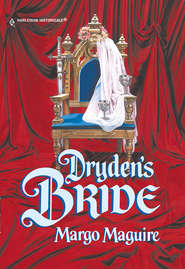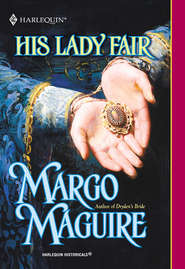По всем вопросам обращайтесь на: info@litportal.ru
(©) 2003-2024.
✖
Norwyck's Lady
Настройки чтения
Размер шрифта
Высота строк
Поля
A bright flash of light from within seared her eyes. Closing them tightly, she flinched with the pain. Nausea roiled in her belly and she swallowed repeatedly, unwilling to embarrass herself before Lord Norwyck.
“God’s bones, woman,” he said, plucking a bowl from the table near her bed, “haven’t you got the sense to seek a basin when you—”
She turned and retched into it, barely conscious of his hand upon her shoulder, gently pulling her over. She did not think it possible to feel any worse, and still live.
She fell back and suppressed a groan. Suddenly, a cool cloth was upon her lips, then soothing her brow. Tears seeped from her eyes.
He remained silent, and if not for his touch, Marguerite would not have known he was there. She did not want to feel any comfort from this stern, unyielding man, yet the warmth of his hand on her chilled flesh sent shivers through her. Mayhap he was not as grim as he wanted her to think.
“I’ll send a maid up to sit with you,” Lord Norwyck said. His voice was devoid of emotion, and Marguerite was glad she had shown none, either. She was sure those tears had only been the result of her violent retching, not because of the fear or helplessness she felt. She did not really need his presence or any reassurance from him to know she would survive.
When she heard his footsteps retreating, and the sound of the chamber door closing, Marguerite nearly convinced herself she felt relieved.
Weary after the long night of battle and chase, Bartholomew left Marguerite in the tower and returned to the great hall.
’Twas insanity to allow her appearance of vulnerability to affect him. She was just a woman, clearly a deceitful one at that. Bart knew all about falling for a dishonest woman. ’Twas not something that would ever happen again.
He crossed the hall and made his way to the study, a warm and cheerful chamber at the southeast corner of the hall.
“My lord.” Sir Walter Gray stood as Bartholomew entered the room.
“Don’t get up, Sir Walter.” The white-haired knight was as weary as any of the men who’d fought all night.
Walter had lived at Norwyck more than thirty years, serving as steward for Bartholomew’s father. He was something of a revered uncle to the Holton sons, and had helped to manage estate matters after their father’s death, while Will and Bart were fighting in Scotland. Sir Walter was Bartholomew’s most trusted advisor. “The last of the men have returned from their northern foray.”
“Any luck cornering Lachann or his son?” Bart asked as he dropped into a chair across from the older man.
The old knight shook his head. “They gave chase all the way to Armstrong land, but were rebuffed by archers when they approached the keep.”
“Did we lose any men?”
“Not this time.”
“There must be some way to take Braemar Keep along with the Armstrong and his bastard son.”
“If there is, we have yet to find it,” Walter said. “’Tis always well guarded by the best Scottish archers.”
Bart made a rude sound.
“There is naught more to do today, my lord. Why don’t you seek your bed now, and rest? Armstrong is not so much a fool as to attack two nights running.”
“You wouldn’t think so,” Bart said as he got to his feet. “But his methods have been unconventional these last few years.”
“To say the least, my lord,” Walter replied.
Bart knew the man blamed himself for not seeing through Felicia’s deception. After all, Armstrong’s son, Dùghlas, had seduced and impregnated her while Walter had been in charge of the estate. But Bartholomew did not blame him. Felicia’s affair had been conducted in secret while Walter managed the estate and the children. It might even have begun before Bartholomew had left for Scotland.
“Still, I cannot believe the scoundrel will come back tonight,” Walter added.
“You may be right, but I do not trust the Armstrong to behave reasonably or predictably,” Bart said as he rubbed his hand across his jaw and his morning whiskers.
Against all convention, Laird Armstrong had corrupted Felicia. He’d set his son, Dùghlas, to seduce her. Then he’d somehow convinced her to deliver William into his trap without so much as a sword being drawn. The man was as devious as a freebooter. “See that guards are posted at every gate,” Bart said. “I want sentries in the hills north of the village. If the Armstrongs come again, we’ll need ample warning.”
“Aye, my lord,” Walter said, “I’ll see to it.”
“I’m going to sleep for a couple of hours,” he said, then he stopped and turned back to Walter. “Send someone for Alice Hoget later. I’d like her to look in on the lady in the tower…while I am present.”
Walter frowned. “Is aught amiss, my lord?”
“I do not know,” Bart replied. “The woman says she cannot remember anything…naught of her past, not even her name.”
When Walter did not respond, Bartholomew continued. “I want Alice’s opinion. I want to know whether such a thing is possible.”
“Aye, my lord,” Walter replied. “’Tis passing strange, though not unheard of. Alice will be here when you awaken.”
Unpleasant dreams plagued Marguerite’s afternoon nap, and she awoke unrefreshed. She supposed the images in her dream must mean something, but she could not imagine what. The faces, the places…all were unfamiliar to her.
The worst parts of the dream had awakened her. She’d felt as if she were drowning, as if her very life was being squeezed out of her. She’d sat up in a panic, her heart pounding, her head aching. Yet still she could remember naught of her past.
The door to her chamber opened suddenly, and a wizened old woman appeared. Gazing at her, Marguerite realized then that her vision had improved significantly. She could see the old lady almost clearly.
“Well, yer looking better than ye did last time I saw ye.”
“You know me, then?” Marguerite cried hopefully, placing a hand over her heart as if she could quiet its hopeful patter.
“Nay, m’lady,” the woman replied. “The only time I’ve ever seen ye was when ye were lying here in this bed, insensible. I’m Alice Hoget. I’m the healer in these parts, but mind ye, I’m no surgeon.”
“Oh.” Marguerite’s shoulders slumped and tears filled her eyes. She had hoped—perhaps unreasonably—for a ready answer to all her questions. But ’twas not to be. She blinked back the tears and sniffed before she noticed a tall, dark figure standing in the doorway behind Alice.
Her heart sank when she realized ’twas Lord Norwyck.
Now that she could see more clearly, she was struck by his handsome features, even though they were mitigated by a thoroughly bad-tempered expression.
His eyes were dark, nearly black, and shadowed by thick, dark brows. He was possessed of a strong chin and jaw, the muscles of which even now clenched in disapproval of her. His lips were full, yet sculpted, his nose straight and aristocratic. His black hair brushed his shoulders.
There was no softness to his features, yet Marguerite had experienced his kindness, no matter how gruffly it had been cloaked.
“Lord Norwyck says ye’ve lost yer memory.”
Unable to find her voice at the moment, Marguerite nodded.
“Can ye remember aught?”
“Only a few faces, bits of a storm,” she said. Her voice was shaky and she struggled to control it. “’Tis a strange sensation to…to feel that there is a memory there, but be unable to bring it out.”
“Aye, it must be,” the old woman said. “But I’ve heard of it—this malady of memory loss.”
“You have?” Marguerite cried, in spite of Lord Norwyck’s approach. “Will it pass? Will I soon remem—?”











